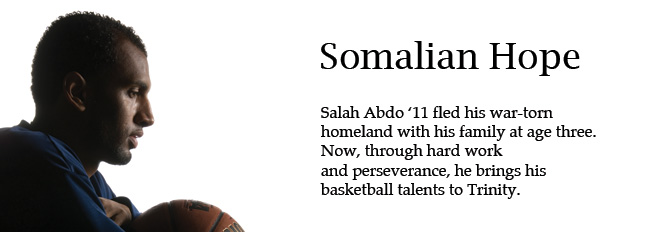
profiles |
1 > |

by Michael Raciti
On February 9, 1991, a year after the Somali civil war began, Hassan Abdo and 35 family members and friends packed into a motor boat, no larger than 20 by eight feet, to flee the once-peaceful town of Brava, Somalia, in search of a new life.
“Rebels attacked [Brava] and people were being killed,” Hassan Abdo recalls 18 years later, from his home in Chelsea, Massachusetts. “My family was not safe—we could not sleep at night.”
Fleeing was a risky venture, as those caught were killed by the warlords, and
those who broke free were forced to find refuge in another world. There was
little room for much beyond fuel and food on the small craft. With no pilot or
compass, they began an 1,100-mile, 15-day excursion over the treacherous waters
of the Indian Ocean.
“People vomited, waves crashed, and water spilled into the boat. There were
sharks everywhere,” Hassan Abdo says of the first night at sea. “We nearly lost
hope. We just prayed and prayed and prayed.”
The group made land, and thanks to luck, smarts, survival tactics, and hope, they worked their way to Kenya and eventually on to Cairo, Egypt. There, Hassan Abdo, who speaks five languages, applied for immigration to the United States. It was granted due to his extensive education and his previous agricultural work with the Somalian and Italian governments.
Bagel Bites, Coca-Cola
One of Hassan Abdo’s six children, Trinity student Salah Abdo ’11, was three years old the day he and his family boarded that boat. He’d turned five by the time they landed in Boston, Massachusetts, where a relative housed them. Besides images of armed soldiers robbing innocent people, Salah says he doesn’t remember much from those years, but fondly recalls his first meal in America: Bagel Bites and Coca-Cola.
“They were so good. Every time I eat them now, it reminds me that I’m an American. There’s no better country. You can do what you will. But while I’m an American during the day, I sleep a Somalian.”
That is why Salah, a guard on the Bantam basketball team, wants to be a role model for young Somalians—to help them understand there is reason for hope.
“Just seeing another Somalian do positive things is encouraging,” he says. “Everyone associates Somalia with pirates and crime—even Somalians. It’s important for young Somalians to know and see that you can do good things with your life.”
Two of the top three Internet searches for Somalia-related topics include the word “pirates.” For Tom Truxes, senior lecturer in the Graduate Studies Program at Trinity and an historian of the early-modern Atlantic economy, romanticized images of pirates—created in Hollywood as well as the academic world—do the country of Somalia no good. “The romanticizing of pirates is very dangerous to a place like Somalia,” he says. “That makes it doubly important for there to be an alternative.”
|
|
1 > |
